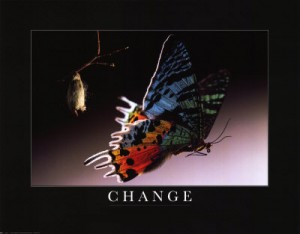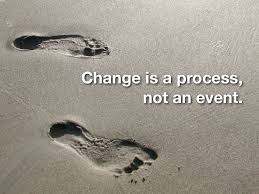 During the holidays, we all begin to look over the past year at what we’ve accomplished (or not) and assess how the past year went.
During the holidays, we all begin to look over the past year at what we’ve accomplished (or not) and assess how the past year went.
Many of us also use this time of reflection to think about the changes we want to make in the coming year. But resolutions can also wreak havoc on your world. Vowing to get healthier, lose weight, be kinder, make more money or find more success can leave you kicking off the New Year with a whole lot of change.
Change = Stress
Change is said to be one of the biggest stressors in life. In fact, there is a test psychologists use to evaluate stress levels in people’s lives called the Life Change Index Scale (LCIS). The LCIS, part of the Journal of Psychosomatic Research, lets you check the items you have gone through, are going through or anticipate going through in the near future and gives you an impact score for each item. It then gives you a score and that score tells you the possible health impact of those stressors, if not managed properly, in a likelihood of illness. The bottom line: “The higher your life change score, the harder you have to work to get yourself back into a state of good health.”
Do We Choose our Stress or Does it Choose Us?
Sometimes change runs smack into us like a freight train (like in the case of unexpected events like serious illness, death in the family or a relationship break up) in these situations, there may have been nothing we could do to prepare or to even see it coming. The surprise element here can leave you feeling confused and overwhelmed. During these times, the best you can do is breathe, let go of resistance as best you can and hang on as you plunge into an unfamiliar territory.
But not all change comes without warning. Many big changes in our life sit looming on the horizon, graduation, marriage, children, a new job, a new town, a new house – all significant change – all (usually) with some amount of foresight and planning. For many people, the idea of change can seem so overwhelming, that they wait until the last-minute to face it or in the case of changes you need to make for yourself that may be hard or scary (finding a new job, leaving a bad relationship) you may decide that it’s easier not to take the plunge into change, even though it’s what you want and need most.
The Myth of Stability and the Stability of Change
You may have heard the saying, “The only thing you can count on is change.” This is a truism because life is change. The knowledge that whatever we are doing or being now will someday change is what gives our lives context and meaning, it is also the most stable thing in life you can count on. Change will happen with or without your cooperation. But even change that promises to be good for you can bring with it a whole host of stressors like self-doubt, fear, anxiety, anticipation and worry. It may lead you to desire to cling to whatever you knew before, to savor stability as long as you can before your life has to change.
But procrastination and denial, can make change that much harder. This is because procrastination and denial are forms of resistance and as we always say, “What you resist – persists.”
How to Thrive when Faced with Change
In those circumstances when you know a change is coming, you can help alleviate some of the stress by spending a little time to prepare yourself for change and for how to manage the additional stress. This will allow you to more quickly recover and allow you to thrive in the midst of change.
Think Positive
Before heading into a planned life change, take a moment to take stock and experience the gratitude you have for everything that was and for the opportunity for change now. Then, make a list of all the positive things that will come as a result of the new change. Spending a moment in gratitude and then keeping an eye on the prize of what will be when all the dust has settled, can help you to remain positive throughout the shift and even help you handle the change more smoothly, because you’ll be reminded of why the change is in order and keep your perspective better, in even the most frustrating of circumstances.
Plan for Possible Hiccups
Every change no matter how good can test your patience. Plan ahead with a few healthful coping mechanisms at the ready should you find yourself in meltdown mode. This can include everything from a brisk walk, or a few bites of chocolate, to calling a friend, or getting a massage, a bit of yoga or a few moments away in the tub. You’ll be surprised at what good even 10-15 minutes taken out from the day to devote to NOT thinking about the stressor and instead, recalibrating and centering yourself can do. Clearing space for yourself, allows you to catch your breath and get your focus back. In fact, neuroscientists say it takes only 20 seconds to take in the good and rewire the brain, to step out of survival mode and into the hormone-balancing awareness that “all is well.”
Let Support In
We often forget that change in our lives can affect the way we are with others. Be sure to give the people you care about a heads up to the turmoil you may be experiencing during this period of change. You may have less time to socialize – you might be a bit overwhelmed or snippier. If the people around you know this ahead of time, not only might you avoid hurting the feelings of your loved ones but they may even be able to help you shoulder some of the burden. At the very least, they can be understanding and supportive of all you’re facing in terms of change.
Focus on your Constants
Because change can create feelings of fear and insecurity, it’s good to keep some constants in your life during your time of flux. If you workout or take a walk each day, if you have a bit of routine, tend to spend time with a loved one or a hobby you enjoy, don’t put these things on hold during the change. It’s important for you to have something easy and familiar to turn to when everything else feels so hard. This can bring a tremendous amount of calm to each day amidst the chaos.
Give in and Give Yourself Patience
Whether the change is unexpected or planned, it’s important to give in to change. No matter your expectations in this life, things are bound to change or sometimes go differently than you envisioned. The trick is to flow with it and not to resist. Resistance is simply the inability to accept what is.
Resistance is powerful energy, and it will strengthen the very thing you seek to oppose. Besides that, the act of resistance distracts us from learning more about what it is we desire to resist. In order to understand and ultimately accept something, we must remain open to its energy, so that we can receive its lesson. Only in this state of surrender, can we become clear and find peace.
Remember that everyone needs time to adjust to change. Give yourself the time and room to accept your new circumstances and make peace with whatever you may have lost in exchange for your change. Being patient with yourself can keep things in perspective. Try not to let new circumstances overwhelm you but rather seek to be present in the moment, paying attention to what you feel and how you react.
Change can be a time of great growth for all of us. Taking things as they are, one day at a time, rather than future tripping about the next month or next year can make the difference between a change that enriches your life and one you resent.
Be well.
Esther and Tara







One thought on “New Year’s Resolutions & Mindful Living: Preparing for Change”
Another good post. Always understand them.